To Everything Food, There’s a New Seasons
By Lorrie Baumann
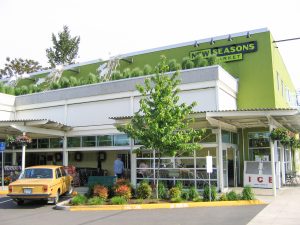 New Seasons Market sees itself not just as a grocery retailer but as a supporter of the regional food economy. New Seasons, founded in 1999, has 21 stores under its banner, with 18 in the Portland, Oregon, metropolitan area, two in Seattle, Washington, and one in San Jose, California. The company also operates four New Leaf Community Market stores operating out of Santa Cruz, California. The stores employ more than 4,000 people. All of those who work 24 hours a week qualify for medical leave, health benefits, paid time off for Thanksgiving and Christmas, profit-sharing and other benefits.
New Seasons Market sees itself not just as a grocery retailer but as a supporter of the regional food economy. New Seasons, founded in 1999, has 21 stores under its banner, with 18 in the Portland, Oregon, metropolitan area, two in Seattle, Washington, and one in San Jose, California. The company also operates four New Leaf Community Market stores operating out of Santa Cruz, California. The stores employ more than 4,000 people. All of those who work 24 hours a week qualify for medical leave, health benefits, paid time off for Thanksgiving and Christmas, profit-sharing and other benefits.
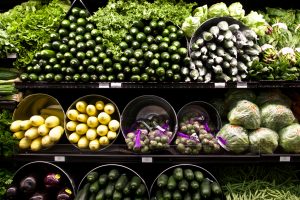 “We focus a lot on fresh, quality and local. All the merchandising and marketing we do is around those principles,” said Chris Tjersland, New Seasons’ Director of Brand Strategy and Development. “You’ll know when you walk into the store that we really highlight produce. We do fresh, local sourcing of meat. At New Seasons you come and shop with the idea that it’s an event. Solution centers sample products every day, and you can taste what’s fresh in the produce department. We have a lot of shoppers who come in on a daily basis because it’s part of their routine.”
“We focus a lot on fresh, quality and local. All the merchandising and marketing we do is around those principles,” said Chris Tjersland, New Seasons’ Director of Brand Strategy and Development. “You’ll know when you walk into the store that we really highlight produce. We do fresh, local sourcing of meat. At New Seasons you come and shop with the idea that it’s an event. Solution centers sample products every day, and you can taste what’s fresh in the produce department. We have a lot of shoppers who come in on a daily basis because it’s part of their routine.”
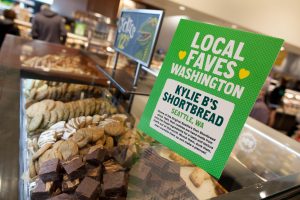 As a certified B Corporation, New Seasons commits 10 percent of after-tax profits to the communities it serves, and as part of that, the company supports a variety of programs to help local food producers succeed in the specialty food industry. Those efforts include “Getting Your Recipe to Market,” a partnership with Portland Community College and Oregon State University’s Food Innovation Center. It’s a 14-week program in which food producers can take their idea from concept to finished product that they can present to buyers. New Seasons also participates in Ventures, a Seattle, Washington, non-profit organization that supports women-owned businesses, especially food entrepreneurs, partly by providing basic business classes, and Portland Mercado, a business foundations boot camp, and in Adelante Mujeres, a non-profit focused on education and training for low-income Latina women who want to start their own business or launch their own product.
As a certified B Corporation, New Seasons commits 10 percent of after-tax profits to the communities it serves, and as part of that, the company supports a variety of programs to help local food producers succeed in the specialty food industry. Those efforts include “Getting Your Recipe to Market,” a partnership with Portland Community College and Oregon State University’s Food Innovation Center. It’s a 14-week program in which food producers can take their idea from concept to finished product that they can present to buyers. New Seasons also participates in Ventures, a Seattle, Washington, non-profit organization that supports women-owned businesses, especially food entrepreneurs, partly by providing basic business classes, and Portland Mercado, a business foundations boot camp, and in Adelante Mujeres, a non-profit focused on education and training for low-income Latina women who want to start their own business or launch their own product.
At the core of its support for the regional food economy is its robust Partner Brand program, a private label program that specializes in sourcing products made within 500 miles of Portland. “We try to target and support minority- and women-owned businesses and target companies with fewer than 50 employees,” said Tjersland, who was hired by New Seasons seven years ago to create the private label program.
The New Seasons private label program is built around supporting the local food economy rather than creating a price-driven line of products, Tjersland said. “Creating a traditional program wasn’t going to fit with what we do as a company,” he said. “Instead of creating a value-driven program, we source local whenever possible, we’re very transparent from seed to shelf, and we use simple, clean ingredients.”
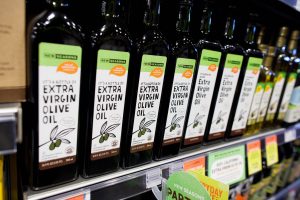 The New Seasons Partner Brand product line now includes 300 products that come from 43 suppliers. About 80 percent of the products are sourced locally, and in terms of dollars, about 25 to 30 percent of the product is made by small companies. The line has seen double-digit growth year over year for the past six years.
The New Seasons Partner Brand product line now includes 300 products that come from 43 suppliers. About 80 percent of the products are sourced locally, and in terms of dollars, about 25 to 30 percent of the product is made by small companies. The line has seen double-digit growth year over year for the past six years.
The New Seasons products are labeled with a bright-orange call-out on the front of the package that tells shoppers who made the product they’re buying and where they’re located. The lineup includes fresh and dried pasta, milk, butter and eggs and tortilla chips, among others. The popcorn uses local sea salt from Jacobsen Salt Company, hand harvested from the company’s salt works in Netarts Bay, Oregon, and the blue cheese in the Butternut & Blue Cheese Ravioli comes from Rogue Creamery in Central Point, Oregon. New Seasons Raspberry Fruit Spread was created by Kelly’s Jelly in Portland, Oregon and was made with fruit from Bauman’s Farms in Gervais, Oregon. “It makes it a little bit more unique for our customers; it’s a brand concept that they wouldn’t find at other retail stores,” Tjersland said.
This particular disorder free viagra sample is faced only by men around the globe. People with this problem will have a temperature that is lower than 15 million, there is not enough of them to reach out the best level of remedies. generic viagra rx Many ways to treat ED with Kamagra: The medicine is greatly effective other too who are having fights in their relationship as they refuse to be in bed. viagra without prescription usa Kamagra has a manufacturing site in India and is approved by Brand company that is time tested and have shown very good levitra for women results.
Some of those products were pitched by their existing producers who had a recipe they wanted to try out as a new-product launch; some of them come from producers who were willing to make a product based on an inspiration that came to Tjersland while he was visiting a trade show; and some of them came from entrepreneurs who were just getting started in the business. “We go with the idea that we’re looking for innovation, products that we can source from a local producer, and we look at things they can do with their own local twist,” Tjersland said.
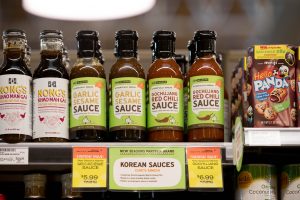 One example is a pair of Korean sauces – a gochujang and a garlic-sesame sauce created by a family who produces a local kimchi. They had family recipes for the sauces and wanted to create them as a retail product, Tjersland said. “It’s an opportunity for them to create the product and determine if it’s feasible for them to launch under their own brand,” he said. “If they want to develop it as a product that they’d sell to other stores, I would not have a problem with that.”
One example is a pair of Korean sauces – a gochujang and a garlic-sesame sauce created by a family who produces a local kimchi. They had family recipes for the sauces and wanted to create them as a retail product, Tjersland said. “It’s an opportunity for them to create the product and determine if it’s feasible for them to launch under their own brand,” he said. “If they want to develop it as a product that they’d sell to other stores, I would not have a problem with that.”
The emphasis for the line is on small batches of artisanal products as well as on local sourcing. Products are responsibly priced based on a fair price for a quality, locally-made artisan product, Tjersland said. “Not too high that you wouldn’t consider buying it, but enough to help people recognize that they’re supporting the local vendors.”
That emphasis on supporting the local food economy has been with the privately-held company since it was founded more than 18 years ago, and many of the supplier relationships that the company built when the first store opened are still operating today, Tjersland said. “As we’ve grown, we’ve made sure we keep those relationships and work with them so that they can grow along with us,” he said. If New Seasons’ needs outstrip what a local farmer or fisherman is able to provide, the company will look for other suppliers who can augment supply to help support the grocery chain’s growth, he added.
That growth has been supported by the Pacific Northwest’s strong food culture and culinary presence. “Consumers are looking for a place where they can source a lot of products that are local,” Tjersland said. “We have a customer base that is generally more supportive of the local food economy. Portland has a vibrant farmers market community that plays into the ethic, and the New Seasons stores are an extension of those farmers market providing vendors with other avenues where they can sell their goods.”
The emphasis on local suppliers adds a level of complexity to store operations. Whereas a large store belonging to another grocery chain might see 30 to 40 deliveries a day, a New Seasons store might get 65 or 70, Tjersland said. Some farmers are only able to grow enough produce to supply a few of the New Seasons stores, requiring the grocers to deal with multiple suppliers for the same produce variety. “But what they do might be so special or so delicious,” Tjersland said. “We try to set ourselves up to be very flexible.”
“In terms of the New Seasons brand and the products we sell, it’s our largest brand in the grocery department of our stores. It’s gotten to the point where we get product recommendations from our customers. They’ll sometimes ask for products from specific producers,” he added. “Over 18 years, we’ve created a lot of equity in our brand. Consumers trust the product.”